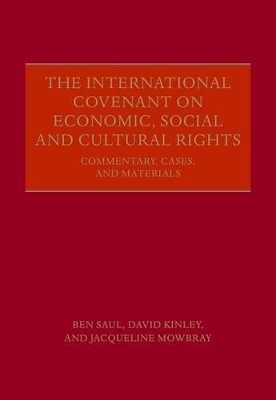
The International Covenant on Economic, Social and Cultural Rights
Oxford University Press (Verlag)
978-0-19-964030-0 (ISBN)
Economic, social and cultural rights are finally coming of age. This book brings together all essential documents, materials, and case law relating to the International Covenant on Economic, Social and Cultural Rights (ICESCR) - one of the most important human rights instruments in international law - and its Optional Protocol. This book presents extracts from primary materials alongside critical commentary and analysis, placing the documents in their wider context and situating economic, social, and cultural rights within the broader human rights framework.
There is increasing interest internationally, regionally, and in domestic legal systems in the protection of economic, social, and cultural rights. The Optional Protocol of 2008 allows for individual communications to be made to the UN Committee on Economic, Social and Cultural Rights after its entry into force in 2013. At the regional level, socio-economic rights are well embedded in human rights systems in Europe, Africa and the Americas. At the national level, constitutions and courts have increasingly regarded socio-economic rights as justiciable, narrowing the traditional divide with civil and political rights.
This book contextualises these developments in the context of the ICESCR. It provides detailed analysis of the ICESCR structured around its articles, drawing on national as well as international case law and materials, and containing all of the key primary materials in its extensive appendices. This book is indispensible for the judiciary, human rights practitioners, government legal advisers and agencies, national human rights institutions, international organisations, regional human rights bodies, NGOs and human rights activists, academics, and students alike.
Ben Saul is Professor of International Law and an Australian Research Council Future Fellow at the University of Sydney. Ben has expertise on global counter-terrorism law, human rights, the law of armed conflict, and international criminal law. He has published 10 books, 75 scholarly articles, and hundreds of other publications and presentations, and his research has been used in national and international courts. Ben has taught law at Oxford, the Hague Academy of International Law and in China, India, Nepal and Cambodia, and has been a visiting professor at Harvard Law School. Ben practises as a barrister in international and national courts, has advised various United Nations bodies and foreign governments, has delivered foreign aid projects, and often appears in the media. He has a doctorate in law from Oxford and honours degrees in Arts and Law from Sydney. Professor David Kinley holds the Chair in Human Rights Law at University of Sydney, and is the Law Faculty's Associate-Dean (International). He is also an Academic Panel member of Doughty Street Chambers in London. He has previously held positions at Cambridge University, The Australian National University, the University of New South Wales, Washington College of Law, American University, and most recently was the founding Director of the Castan Centre for Human Rights Law at Monash University (2000-2005). He was a Senior Fulbright Scholar in 2004, based in Washington DC, and Herbert Smith Visiting Fellow at the Faculty of Law, University of Cambridge during the first half of 2008. He has written and edited eight books and more than 80 articles, book chapters, reports, and papers. Jacqueline Mowbray is a Senior Lecturer in Law at the University of Sydney. She also teaches on the European Regional Master's Degree in Democracy and Human Rights in South-East Europe, based in Sarajevo. She is a graduate of the Universities of Queensland (BA/LLB (Hons)), Melbourne (LLM) and Cambridge (LLM (Hons), PhD).
1. Introduction ; 2. Article 1: The right of self-determination ; Article 25: The right to freely utilize natural resources ; 3. Article 2(1): The principle of progressive realisation ; 4. Article 2(2): Non-discrimination ; 5. Article 2(3): Developing state exception ; 6. Article 3: Equality ; 7. Article 4: General limitations clause ; Article 5: Prohibition of abuse of rights ; Article 24: No prejudice to the United Nations ; 8. Article 6: The right to work ; 9. Article 7: Just and favourable conditions of work ; 10. Article 8: Trade union-related rights ; 11. Article 9: The right to social security ; 12. Article 10: Rights of families, mothers and children ; 13. Article 11: The right to an adequate standard of living ; 14. Article 12: The right to health ; 15. Article 13: The right to education ; Article 14: Primary education ; 16. Article 15: Cultural Rights
| Erscheint lt. Verlag | 6.3.2014 |
|---|---|
| Verlagsort | Oxford |
| Sprache | englisch |
| Maße | 177 x 249 mm |
| Gewicht | 1856 g |
| Themenwelt | Recht / Steuern ► EU / Internationales Recht |
| Recht / Steuern ► Öffentliches Recht ► Völkerrecht | |
| Sozialwissenschaften ► Politik / Verwaltung | |
| Sozialwissenschaften ► Soziologie | |
| ISBN-10 | 0-19-964030-0 / 0199640300 |
| ISBN-13 | 978-0-19-964030-0 / 9780199640300 |
| Zustand | Neuware |
| Haben Sie eine Frage zum Produkt? |
aus dem Bereich


